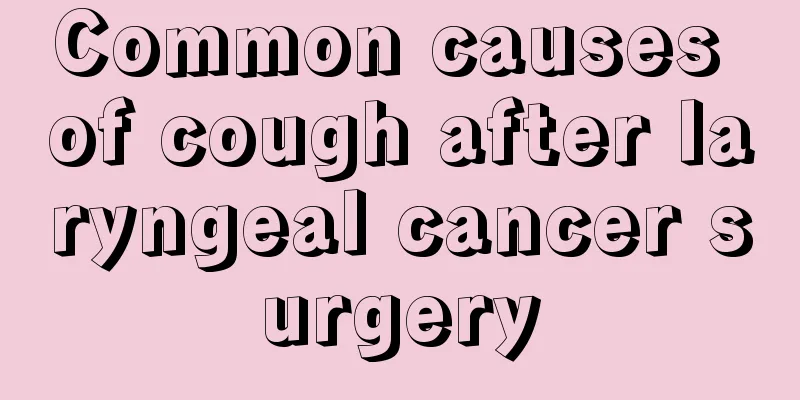Common causes of cough after laryngeal cancer surgery

|
Patients with laryngeal cancer may also experience a series of complications after surgery to remove the tumor. Coughing is one of the common symptoms. Frequent coughing is not conducive to wound healing and can also disturb the patient's mood. There are three main factors that cause patients to cough frequently after surgery. 1. Respiratory secretion factors Tracheotomy and fistula after laryngeal cancer surgery changes the integrity of the normal respiratory tract, the function of the respiratory mucociliary membrane changes, and the secretions increase. In the early postoperative period, patients are afraid to forcefully sputum due to wound pain and other factors. Sputum accumulates and forms scabs, which irritates the tracheal wall and causes coughing. Obvious sputum sounds or noises inside the cannula can also be heard. 2. Tracheal tube factors After tracheotomy, patients often feel uncomfortable when wearing the cannula for the first time, which causes some irritation to the trachea and causes irritating dry cough. Some cases are caused by the cannula being too large or too curved, causing the distal end of the cannula to collide with the anterior wall of the trachea, which causes coughing. The main manifestations are induced or postural coughs, often accompanied by blood in sputum. Severe coughs can sometimes be relieved by replacing the appropriate cannula or adjusting the tightness of the cannula tie. 3. Mucosal incision suture During vertical hemi-laryngectomy and middle laryngectomy, due to surgical interference, mucosal edema, inflammatory reaction, etc., the mucosal sense reaction is slow, saliva swallowing is difficult, and it is easy to cause aspiration, and choking and coughing are inevitable. In more obvious cases, there is an itchy feeling in the throat and a foreign body sensation. Mucosal trauma and absorption of thread head stimulation can also cause patients to cough violently. In this case, patients should try not to cough vigorously to avoid affecting wound healing. They should follow the doctor's advice to use appropriate antitussive drugs to control coughing. |
<<: What are the early symptoms of female brain cancer patients
>>: How to deal with anxiety in patients with brain cancer
Recommend
Acute lymphoma treatment with traditional Chinese medicine
We all know that acute lymphoma is a malignant tu...
Urethra stinging after urinating
Urination is an essential daily behavior of the h...
What soup should I drink after surgery to help me recover faster
After surgery, many people are weak, so they must...
What is the most effective way to prevent uterine cancer? Teach you 4 ways to stay away from uterine cancer
Uterine cancer is one of the common tumors of the...
First aid for heart disease
The incidence of heart disease is getting higher ...
What are the methods of neck exercise
Sitting for a long time will not only cause neck ...
How to clean a silicone bra
Silicone bras are common women's clothing. In...
What is the reason why people with thyroid cancer have no taste for food
Thyroid cancer patients have no taste for food, w...
How many years can a person with renal pelvis and kidney cancer live
Kidney cancer is a disease that is difficult to c...
Anti-inflammatory drugs plus saline for more than 4 hours
If you have bacterial infection and inflammation,...
This is what eyelid liposuction is all about
Blister eyes, also called swollen eye blisters in...
How to check for melanoma
Each of us may have various moles of different si...
What to do if you have severe stomach problems and vomiting
Gastric disease is a general term. There are many...
Can colorectal cancer liver metastasis still be operated on
Does metastasis mean that surgery is no longer po...
Family members should strictly take care of patients with cardia cancer
Cardiac cancer is a very serious disease. Once co...









